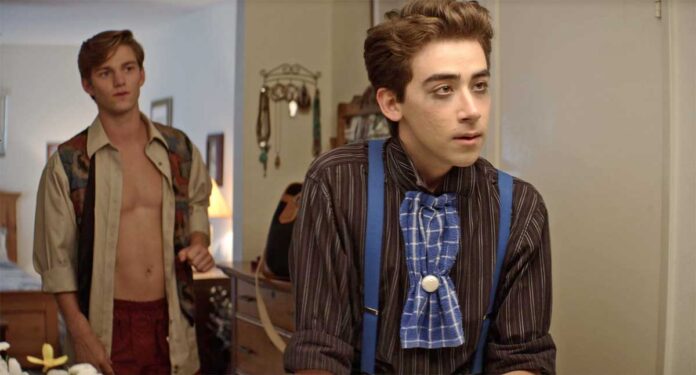Many plays set in a single location involve a handful of characters gathering together for fun only to spill secrets, lies, and tears. This narrative strategy is employed by out gay writer/director Jonathan Wysocki in his modest, touching film, “Dramarama,” available on demand September 7.
Set in 1994 in Escondido, CA, this chamber piece has five high school theatre nerds gathering for an overnight party at Rose’s (Anna Grace Barlow) house. They are saying goodbye to Rose, who is leaving for NYU in the morning. (Don’t belabor the fact that she is not frantically packing or that her parents are out for most of the night). The guests include Ally (Danielle Kay), Oscar (Nico Greetham), Claire (Megan Suri), and Gene (Nick Pugliese). The festivities begin with a Victorian character-themed murder mystery, which allows the friends to be theatrical: dressing up in costume, talking with accents, and making bad puns. Their enthusiasm will be appreciated by anyone who was a theatre geek in high school. (All others: you have been warned).
Before long, however, the group’s fun is temporarily spoiled. JD (Zak Henri) arrives with some pizzas Rose ordered. He is a truth teller and sizes up each character in just a word. Rose, in particular, is incensed (he calls her callow), and Oscar, who appears to be smitten with JD, doesn’t quite realize that he has been insulted when JD describes him as grandiloquent.
Viewers can figure out the character dynamics even without JD’s targeted pronouncements. Rose very much wants to be loved, and schemes to have things her way. Ally is more jaded and sarcastic; she has a sense of reality that is missing from the others. Claire is prim and proper, so her defenses will go down. As for Gene, he is considering coming out to his friends at the party. He is, obviously crushed on the adorable Oscar — just watch the way they wrestle, or the way Gene spies on a shirtless Oscar in a mirror. Oscar himself may be gay or even bisexual; he claims to have a long-distance girlfriend. But it also means each character has one defining characteristic. To make them more complex, all these teens are religious. Despite having varying degrees of faith, they are mostly inexperienced when it comes to sex and dating.
The topic of sex and dating comes up often in “Dramarama,” and brings out the tensions between the characters. They diffuse their internal fears and anxieties by quoting lines from the theater and dropping too on-the-nose pop culture references from “Fried Green Tomatoes” and “The Adventures of Priscilla, Queen of the Desert,” and repeatedly mention the scandalous Madonna. The teens also make everything a game, from faking a trip to the ER when Gene pretends to faint, to playing “flashlight homosexual,” where two people of the same sex get caught doing something suggestive in bed. The games reveal something about each character. Claire’s participation in “Truth or Dare” is her way of showing she is not a prude, and it allows her to ask Gene who his current crush is. Viewers will be absorbed in these activities, even when they turn mean-spirited. Ally pulls a prank on Rose that backfires, and Gene and Oscar blurt out some secrets they have been keeping for each other. The nastiness is never excessively cruel, but the truth does hurt.
Wysocki certainly captures the way these kids think and speak and react to all this drama, which is of course, especially heightened for a group of theatrical teens. To the film’s credit, the ensemble cast makes the friendships, rivalries, and unspoken desires believable. Arguably the best moment in the film has Oscar telling Gene that he feels like Gene is pushing him away. This candor prompts Gene to hint at his homosexuality, talking about a gay coworker as a way of measuring Oscar’s evolving thoughts on the subject, and to gauge how his other friends could react to his disclosure. Rose and Ally also get a nice heart-to-heart, which shows a real depth to these characters. It is easy to care about them.
But “Dramarama” can also feel overdramatic at times, as these teens all feel too much and flinch at just the slightest provocation. The characters may push each other’s buttons, but everyone is too sensitive and trying so hard to avoid reality that what should feel awkward — like Claire’s crush on Gene — feels forced. The film can be rather cringe-inducing during these moments, or a sequence where some of the friends shoot a video mocking the others.
Ultimately, “Dramarama” lets the quiet power of its final poignant moments resonate in lieu of dropping big bombshells and wreaking emotional devastation. Unlike the characters whose ambitions exceed their reality, Wysocki’s film only wants to charm folks who feel nostalgia for (or are perhaps embarrassed by) their geeky high school theater cliques. In that respect, he succeeds admirably.
